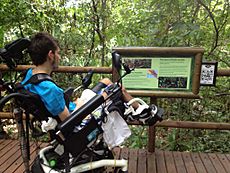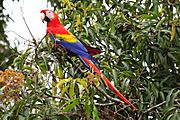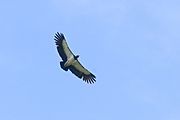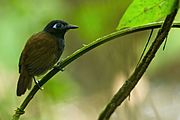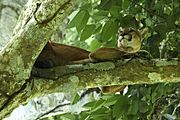Carara National Park facts for kids
Quick facts for kids Carara National Park |
|
|---|---|
|
IUCN Category II (National Park)
|
|
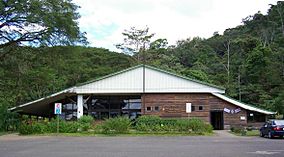
Entrance
|
|
| Location | Costa Rica |
| Area | 52 km2 (20 sq mi) |
| Established | 1978 |
| Governing body | National System of Conservation Areas (SINAC) |
| Lua error in Module:Location_map at line 420: attempt to index field 'wikibase' (a nil value). | |
Carara National Park is a special protected area in Costa Rica. It's located near the Pacific coast. This park helps protect many amazing plants and animals.
It was first set up in 1978 as a biological reserve. Later, in 1998, it became a national park because so many people wanted to visit it. Carara is about 48 kilometers (30 miles) west of San José, the capital city. It's also about 24 kilometers (15 miles) north of the beach town of Jacó. The park protects the River Tárcoles and its surroundings. It's also home to one of the largest groups of wild scarlet macaws in Costa Rica.
Contents
Amazing Animals and Plants
Carara National Park has a lot of primary rainforest. This means it has very old trees and thick plant growth. It's wetter than some other parks, which makes it a perfect home for many different creatures.
Birds Galore
Carara is one of the best places in Costa Rica for birdwatching. There are 432 different kinds of birds here! You can see bright red scarlet macaws flying around. Other colorful birds include orange-chinned parakeets and many other parrots.
Look out for tiny hummingbirds, busy woodpeckers, and unique motmots. You might also spot jacamars, manakins, and antbirds. Several types of trogons live here, like the black-throated trogon. Water birds are also common, such as the anhinga, different herons, egrets, and kingfishers.
Reptiles and Amphibians
The park is home to many reptiles. The River Tárcoles forms the northern border of the park. This river is famous for its large American crocodiles. You can often see them resting on the riverbanks.
Carara also has 52 types of snakes and other reptiles. These include various lizards and geckos. Among the amphibians, you might find colorful green and black poison arrow frogs.
Mammals of the Forest
Spotting mammals in Carara can be tricky. The dense trees make it hard to see them. But many mammals live here! These include white-tailed deer and red brockets. You might also see collared peccaries, which look like wild pigs.
Other animals include agoutis and kinkajous. Monkeys are also present, like Panamanian white-faced capuchin monkeys and mantled howler monkeys. Two types of sloths live here: Hoffmann's two-toed sloths and brown-throated three-toed sloths. White-nosed coaties are also common. Recently, pumas have been seen in the park again!
Park Features for Everyone
Carara National Park has a special universal footpath. This path is designed to be easy for people with disabilities to use. It has cool features like audio-visual guides and things you can touch.
The architect Ibo Bonilla designed this path. It was built with help from many people. Along the path, you'll find animal sculptures and maps you can feel. There are also signs written in Braille. The path has gentle slopes, benches for resting, and information booths.
Ancient History in the Park
Carara National Park is not just about nature. It also has fifteen archaeological sites from ancient times. These sites show how people lived in Costa Rica long ago. They belong to two main periods: the "Pavas" period (300 BC to 300 AD) and the "Cartago" period (800-1500 AD).
Two sites are especially important. One has a rectangular stone base, about 6 by 4 meters. It was built from limestone and river rocks during the "Cartago" period. Another key site is called Hills Burial. This was a large village and burial area on a hill. It overlooks the River Tárcoles. Experts believe this village was very powerful in the area long ago.
Gallery
- Biodiversity at Carara National Park
-
Scarlet macaws are one of the chief attractions in Carara National Park.
See also
 In Spanish: Parque nacional Carara para niños
In Spanish: Parque nacional Carara para niños
 | DeHart Hubbard |
 | Wilma Rudolph |
 | Jesse Owens |
 | Jackie Joyner-Kersee |
 | Major Taylor |


